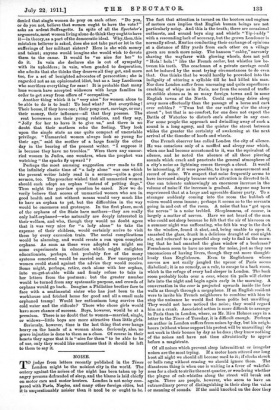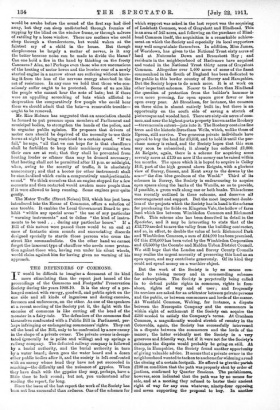NOISE.
TO judge from letters recently published in the Times London might be the noisiest city in the world. The outcry against the noises of the night has been taken up by angry persons defrauded of sleep, and the blame is laid chiefly on motor cars and motor hooters. London is not noisy com- pared with Paris, Naples, and many other foreign cities, but it is unquestionably noisier than it need be or ought to be.
The fact that attention is turned on the hooters and engines of motors cars implies that English human beings are not particularly noisy. And this is the truth; there are occasional outbursts, and errand boys sing and whistle "Y ip-i-addy " with a resounding lack of accuracy, but the grown Londoner is normally silent. Rustics conducting their exchange of opinions at a distance of fifty yards from each other on a village green are much more noisy. The hansom "cabby," narrowly shaving the wayfarer with glowing wheels, does not yell " Hola! hola!" like the French cocher, but whistles low be- tween his teeth. The coachman of a private carriage could not be induced by the most trying circumstances to do even that. One thinks that he would hardly be provoked into the indignity of uttering a syllable till he had killed his man. Nor does London suffer from unceasing and quite superfluous cracking of whips as in Paris, nor from the sound of traffic on cobble stones as in so many foreign towns and in some English towns of the North. Could anything drive sleep away more effectually than the passage of a horse and cart over cobbles ? "'Twas but the car rattling o'er the stony street " ; but that is no comfort, for one does not expect the Battle of Waterloo to disturb one's slumber in any case. For some people the approach and dwindling away of such a sound is a long agony, and the quieter the street between whiles the greater the certainty of awakening at the next arrival of the thunder of hoofs and wheels.
One French observer has called London the city of silence. He was conscious only of a muffled and sleepy roar which, when one had become accustomed to it, was the equivalent of silence, and be noted the absence of all those piercing sounds which crack and penetrate the general atmosphere of a city's noise as lightning comes through a cloud. It would be interesting, if it were possible, to keep a measurement and record of noise. We suspect that noise frequently seems to have increased simply because one's attention is directed to it. One can tolerate unknowingly an enormous increase in the volume of noise if the increase is gradual. Anyone may have experienced that at a large and agreeable dinner party. To a stranger suddenly coming into the room the hubbub of voices would seem insane ; perhaps it seems so to the servants going in and out of the room. A noise that has "got upon the nerves" is a noise trebled. Sleeplessness, of course, is largely a matter of nerves. Have we not heard of the man who could not sleep because he felt that the air of his room on a summer night was suffocating, who felt his way in the dark to the window, found it shut, and, being unable to open it, smashed the glass, drank in a delicious draught of cool night air, and returned to a peaceful sleep only to find in the morn- ing that be had smashed the glass window of a bookcase ? Frenchmen seem to have no nerves for noise, just as they are unconscious of having livers, though they eat more thought- lessly than Englishmen. Even to Englishmen whose nerves are not easily jangled the uproar of Paris seems diabolical; it is no remedy, as a rule, to escape to a back room, which is the refuge of every bad sleeper in London. The back room probably looks over a cour, where tin pails will clatter late into the night and begin again early in the morning. A conversation in the cour is projected upwards inside the four walls as though through a megaphone. If an English resident were to invite his French neighbours to combine with him to stop the nuisance he would find them polite but unwilling They would not have noticed the noise ; they would regard him as a crank. Associated action is more difficult to arrange in Paris than in London, where, as Mr. Rice Holmes says in a letter to the Times of Tuesday, it is difficult enough. Perhaps an author in London suffers from noises by day, but his neigh- bours (without whose support his protest will be unavailing) do not work in their houses by day as he does ; they know nothing of the noises and have not time altruistically to appear before a magistrate.
Of all noises which prevent sleep intermittent or irregular noises are the most trying. If a motor horn uttered one long hoot all night we should all become used to it; if clocks struck or bells rang without ceasing we should ignore them. The disastrous thing is when one is waiting in a fever of wakeful- ness for a clock to strike the next quarter, or wondering whether the plague of cab-whistles along the street will break out again. There are people, however, who seem to have an extraordinary power of distinguishing in their sleep the value or meaning of sounds. If the maid knocked on the door they
would be awake before the sound of the first rap had died away, but they can sleep undisturbed through frenzies of rapping by the blind on the window frame, or through salvoes of rattling by a loose window. There are mothers who could sleep through a thunderstorm, but would waken at the faintest cry of a child in the house. But though sleeplessness be largely a matter of nerves, is it any the better because noise can be made to divide the blame? Can one hold a fire in the hand by thinking on the frosty Caucasus ? Alas, no I Perhaps even those who are unconscious of the hooting of motor horns and the leonine roar of a newly started engine in a narrow street are suffering without know- ing it from the loss of the nervous energy absorbed in the act of resistance. In any case we hold that those who con- rsciously suffer ought to be protected. Some of us are like the people who cannot hear the note of bats; but if there were an appalling screeching of bats which afflicted to desperation the comparatively few people who could hear them we should admit that the bats—a removable trouble— ought, to be removed.
Mr. Rice Holmes has suggested that, an association should be formed to put pressure upon members of Parliament and municipal bodies, to strengthen the hands of the police, and to organize public opinion. He proposes that drivers of motor cars should be deprived of the necessity to use their horns at night by being restricted to a certain speed. " If we fail," he says, "all that we can hope for is that chauffeurs shall be forbidden to keep their machinery running when their cars are at rest; that they shall be prevented from hooting louder or oftener than may be deemed necessery ; that hooting shall not be permitted after 11 p.m. or midnight, when, owing to the scarcity of traffic, it is absolutely unnecessary; and that a hooter (or other instrument) shall be standardized which emits a comparatively unobjectionable so and." We think ourselves that an engine stopped for a few moments and then restarted would awaken more people than if it were allowed to keep running. Some engines purr quite gently.
The Motor Traffic (Street Noises) Bill, which has just been introduced into the House of Commons, offers a solution of one trouble. It enables the Local Government Board to pro- hibit "within any special areas" the use of any particular "warning instruments" and to define " the kind of instru- ments to be used . . during any particular hours." If a Bill of this nature were passed there would be an end at once of fantastic siren sounds and excruciating discords designed specially to startle those persons who cross the street like somnambulists. On the other hand we cannot forget the innocent type of chauffeur who needs some protec- tion against those who, having run under his silent wheels, would claim against him for having given no warning of his approach.







































 Previous page
Previous page